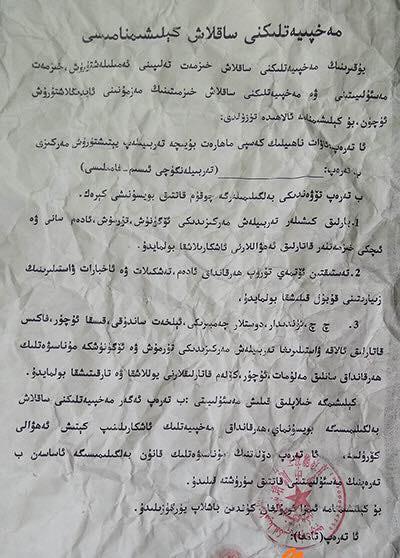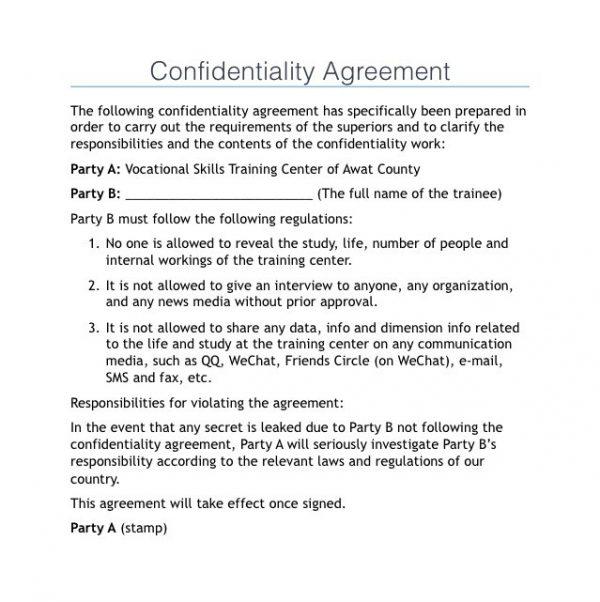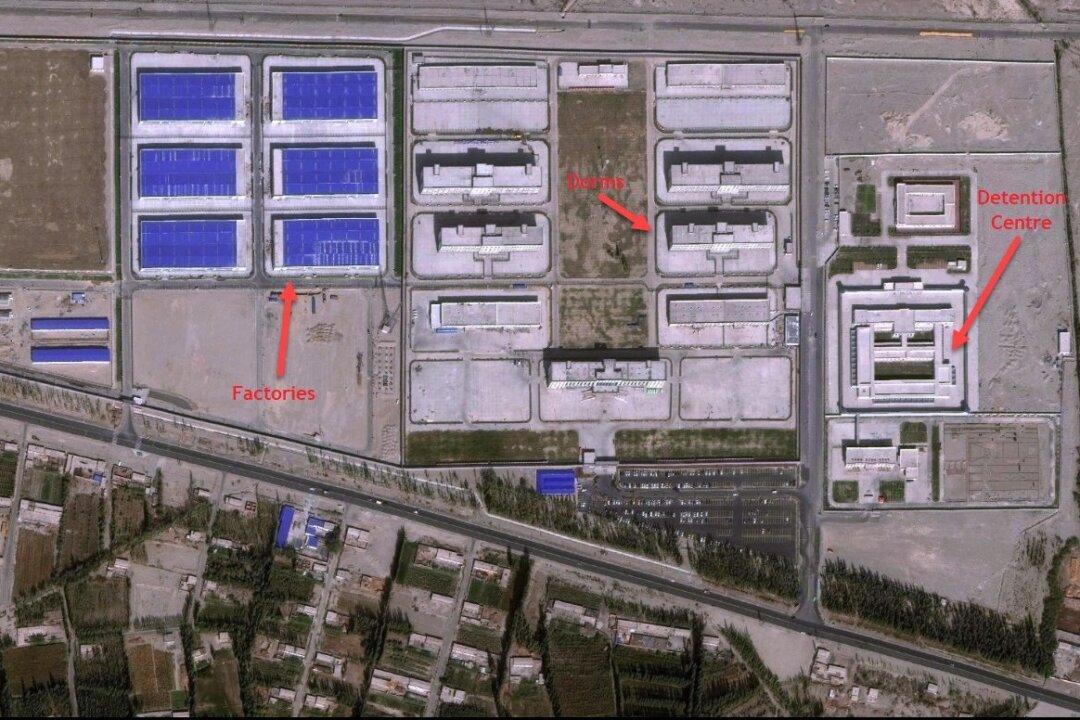Xinjiang officials are drastically ramping up efforts to conceal evidence of the scale and true nature of “vocational re-education centers” where at least 1 million predominantly Muslim Uyghurs are believed to be held, ahead of an expected international inspection, according to sources in the region.
A confidentiality agreement for prisoners detained at a facility located in Awat County, Xinjiang, was obtained by The Epoch Times. The agreement, written in the Uyghur Arabic alphabet, says that prisoners must not “reveal the study, life, number of people, and internal workings of the training centers” through social media, SMS messaging, or media interviews, or they will be held accountable “according to the relevant laws and regulations of our country.”
It also mentions the detainees will undergo concentrated closed door training for at least one year, mainly to learn the national language, laws and regulations and technical skills.
Xinjiang residents must say “only good things about the government,” and “praise the [Communist] Party’s policies,” a businessman from Ghulja city in Ili Kazakh Autonomous Prefecture who is currently trading in neighboring Kazakhstan, told RFA.
“People are taught what to say, and they were warned not to mention the difficulties they are facing,” he said.


Several U.N. member states called on China to allow observers into the region during the U.N. Human Rights Council’s universal periodic review on Nov. 6 last year. That’s occurred amid growing international awareness and mounting evidence of rapidly built mass-detention facilities in Xinjiang facilities through satellite imagery compiled by online researchers.
Numerous testimonies from former Uyghur detainees have also revealed the widespread human-rights abuses suffered by those both inside and outside the camps, including what the Uyghur diaspora is calling a genocide of its culture by the Chinese Communist Party (CCP).
Uyghurs, along with other ethnic minorities in Xinjiang and Tibet, as well as religious believers who remain outside state control, have long been targeted by the ruling CCP for thought transformation through “re-education”—what outsider observers call brainwashing.
The facilities were renamed as “vocational training centers” and now, mounting evidence suggests that detainees are being exploited in forced labor facilities within the camps-turned-training centers.
- Ex-Prisoner Says China’s ‘Vocational Training Centers’ a Complete Lie
- Prisoners Tortured, Drugged, Killed by Injection in Xinjiang ‘Re-Education Camps,’ Ex-Inmate Reveals
- US Reviews Report of Imports from Forced Labor in China Camp
- World Uyghur Congress President Sounds Alarm Over Organ Harvesting in China
- West Calls on China to Close Uyghur Detention Camps
Game of Deception
Uyghur businessman Abdurahman Hasan, who fled Xinjiang in January 2017 after he was blacklisted by the CCP, believes Beijing is making efforts to relocate prisoners to deceive international inspection teams.“Now, they are moving a lot of people to inner China. I think China is trying to cheat international organizations,” Hasan told The Epoch Times in a phone interview from Istanbul.
Chinese provinces including Heilongjiang, Inner Mongolia, Shaanxi, and Gansu have each been set a quota of prisoners to take in, CCP sources told Bitter Winter. Shaanxi Province has reportedly been assigned a quota of 25,000.
Thousands of Uyghurs were transferred from Kashi prefecture in September 2018, and the CCP is being meticulous in concealing the detainees’ movements, insiders with knowledge of the transfers told the magazine.
During the relocation, buses are covered with misleading labels, windows are blacked out, and Uyghurs are transferred at night with their heads covered in black sacks, according to insiders. In addition, officers communicate using hand gestures, uniforms are stripped of badges and ID numbers, and license plates are concealed.
Destruction of Evidence
Nathan Ruser, a researcher at the Australian Strategic Policy Institute (ASPI), told The Epoch Times that he believes the CCP would work ahead of any expected inspection to remove evidence that could indicate the facilities are punitive in nature, as well as improve the appearance of existing aspects of the camps to fit their narrative of them being teaching facilities for “vocational skills.”“They could take a few fences down so the detainees have more movement inside the facility,” Ruser said. “We might see a stronger focus on factories especially and I think we’ll see a sanitation—they’ll make the factories a lot nicer quality. I think they’ll try to highlight the classroom buildings and the administration buildings, rather than the dormitories.”
A police station officer from the Tazghun township told RFA that authorities already have removed barbed wire from camp walls, metal bars from cell doors and windows, and taken down CCTV cameras.
In recent weeks, PRC flags have been removed from Xinjiang’s streets and replaced with “decorative reproductions of Uyghur musical instruments,” the businessman from Ghulja told RFA. He added that residents are being trained to sing and dance, and are told to “smile joyfully” while looking “happy, enthusiastic … and content with life.”
“No one may look sad, otherwise there will be consequences,” he said.
Xinjiang officials may attempt to “underplay the numbers” of detainees, while focusing on the “vocational-training aspect,” Ruser added.





